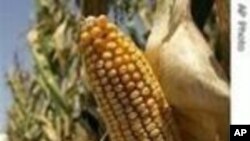Maize is the most widely grown food crop in Africa. It is the main food source for 300 million Africans. It is severely affected by drought, and Africa is a drought-prone continent. The effects of drought are especially devastating to small–scale farmers in sub-Saharan Africa, where crop yields diminished by inclement weather are common.
The need to alleviate the devastation caused by frequent droughts led to the formation of a public-private partnership known as Water Efficient Maize For Africa, or WEMA. WEMA is an organization dedicated to reducing crop failure and alleviating hunger and poverty by developing drought-tolerant, high-yielding maize varieties that are adapted to African conditions.
At the head of WEMA stands the African Agricultural Technology Foundation, an African-run organization. It is supported by Kenya, Mozambique, South Africa, Tanzania and Uganda. Other partners include Monsanto, a U.S.-based crop biotechnology company and the International Maize and Wheat Improvement Center, a Mexico-based non-profit institution dedicated to the development of improved varieties of wheat and maize. The project is in large part financed by the Bill and Melinda Gates Foundation and the Howard Buffett Foundation, who pledged a total of $47 million to fund the effort.
"This project, conducted mostly in Africa and for Africans, will result in improved maize hybrids, yielding an additional 25 percent more grain under moderate drought conditions, compared to the best African seed currently available," said Vanessa Cook, Monsanto's WEMA project lead.
The new, less thirsty corn varieties will be developed using a combination of traditional plant breeding as well as molecular techniques, also known as biotechnology or genetic engineering. WEMA hopes to develop the new maize varieties in the next 5 years.
Rajiv Shah, director of agricultural development at the Gates Foundation, said: "Our long-term goal with this project is to give farmers access to crops that can protect them from frequent drought, so they can feed their families, increase their incomes and build better, healthier lives."
"Governments and nations are more likely to become unstable when their populations are hungry and underfed," U.S. Secretary of State Hillary Clinton said. "We are committed to building a new partnership among donor states, developing nations, UN agencies, NGOs, the private sector and others to better coordinate policies to achieve the Millennium Development Goals," she said.
The need to alleviate the devastation caused by frequent droughts led to the formation of a public-private partnership known as Water Efficient Maize For Africa, or WEMA. WEMA is an organization dedicated to reducing crop failure and alleviating hunger and poverty by developing drought-tolerant, high-yielding maize varieties that are adapted to African conditions.
At the head of WEMA stands the African Agricultural Technology Foundation, an African-run organization. It is supported by Kenya, Mozambique, South Africa, Tanzania and Uganda. Other partners include Monsanto, a U.S.-based crop biotechnology company and the International Maize and Wheat Improvement Center, a Mexico-based non-profit institution dedicated to the development of improved varieties of wheat and maize. The project is in large part financed by the Bill and Melinda Gates Foundation and the Howard Buffett Foundation, who pledged a total of $47 million to fund the effort.
"This project, conducted mostly in Africa and for Africans, will result in improved maize hybrids, yielding an additional 25 percent more grain under moderate drought conditions, compared to the best African seed currently available," said Vanessa Cook, Monsanto's WEMA project lead.
The new, less thirsty corn varieties will be developed using a combination of traditional plant breeding as well as molecular techniques, also known as biotechnology or genetic engineering. WEMA hopes to develop the new maize varieties in the next 5 years.
Rajiv Shah, director of agricultural development at the Gates Foundation, said: "Our long-term goal with this project is to give farmers access to crops that can protect them from frequent drought, so they can feed their families, increase their incomes and build better, healthier lives."
"Governments and nations are more likely to become unstable when their populations are hungry and underfed," U.S. Secretary of State Hillary Clinton said. "We are committed to building a new partnership among donor states, developing nations, UN agencies, NGOs, the private sector and others to better coordinate policies to achieve the Millennium Development Goals," she said.













